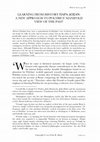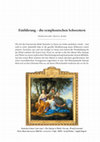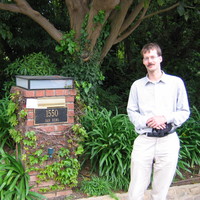Papers by Felix K. Maier
Daniel Moore, Polybius. Experience and the Lessons of History. (Historiography of Rome and Its Empire, Vol. 6.) Leiden, Brill 2020
Historische Zeitschrift
Quantitative Daten und hermeneutische Verfahren in den „digital classics“
In einem 2013 in der Digital Humanities Quarterly publizierten Aufsatz pladiert H. Porsdam fur di... more In einem 2013 in der Digital Humanities Quarterly publizierten Aufsatz pladiert H. Porsdam fur die Notwendigkeit, das richtige Gleichgewicht zwischen qualitativen und quantitativen Forschungsmethoden in den immer mehr durch die Digitalisierung gepragten Geisteswissenschaften zu finden. Zum einen geht sie von der Beobachtung aus, dass sich die Wissensproduktion und die akademische Forschung wegen der Anwendung von digitalen Technologien verandern (§7); zum anderen, dass die Digitalisierung in den Geisteswissenschaften mit dem erhohten Druck einhergeht, quantitative Ergebnisse als „gultiger” zu betrachten sowie nicht quantifizierbare Aspekte der Forschungsmaterialien auser Acht zu lassen.

Rückzug aus Kalkül. Das Palastkaisertum im Weströmischen Reich unter Honorius
Historische Zeitschrift
Zusammenfassung Im Jahr 395 wurde der zehnjährige Honorius Kaiser des Weströmischen Reiches. Hono... more Zusammenfassung Im Jahr 395 wurde der zehnjährige Honorius Kaiser des Weströmischen Reiches. Honorius verbrachte die meiste Zeit seiner Herrschaft zurückgezogen im Palast und überließ seinen Heermeistern die Kommandogewalt bei militärischen Operationen. In der Forschung hat man die Regierungsphase des Honorius oft als Symptom für einen Niedergang angesehen. Das neu entstandene Palastkaisertum habe den Machtkämpfen am Hof und innerhalb des Reiches Vorschub geleistet und die Zentralgewalt sukzessive ausgehöhlt, so dass Rom – vor allem im Westen – den Bedrohungen an der Reichsgrenze schutzlos ausgeliefert gewesen sei. Die vorliegende Studie wendet sich gegen eine solche Sichtweise und argumentiert stattdessen, dass das Palastkaisertum des Honorius nicht dem jungen Alter des Kaisers geschuldet war und auch nicht den Niedergang des Weströmischen Reiches einläutete; das vermeintlich ,passive‘ Regieren stellte vielmehr eine adäquate Reaktion auf die komplexen außen- und innenpolitischen He...
Kurt A. Raaflaub (Ed.), Thinking, Recording, and Writing History in the Ancient World. (The Ancient World: Comparative Histories.) Chichester, Wiley 2014
helden.heroes.heros, 2020

Digitale Altertumswissenschaften: Thesen und Debatten zu Methoden und Anwendungen, 2020
Der immer stärker werdende Einfluss digitaler Verfahren und Technologien in geis-teswissenschaftl... more Der immer stärker werdende Einfluss digitaler Verfahren und Technologien in geis-teswissenschaftlicher Forschung und Lehre hat in den letzten Jahrzehnten auch in den Altertumswissenschaften beträchtliche Umbrüche eingeläutet. Methoden und wissenschaftliche Praxis geraten auf allen Ebenen in einen Prozess grundlegen-der Umwandlung. Trotz vieler bereits erfolgter Veränderungen befindet sich die Entwicklung jedoch gerade erst in einer Beschleunigungsphase. Diese lässt einer-seits zahlreiche Möglichkeiten neuer Verbindungen zwischen unterschiedlichen Materialien (analog / digital) am Horizont erscheinen sowie eine Erweiterung der Forschungsmethoden, welche wiederum neue Fragestellungen generieren, und sie setzt andererseits ein gewaltiges Innovationspotential frei, das auch ungekannte Probleme und Herausforderungen mit sich bringt.1 Die altertumswissenschaftlichen Fächer der Klassischen Philologie und der Alten Geschichte befinden sich derzeit an einem neuralgischen Punkt. Immer wieder kommt es zu strukturellen und inhaltlichen Problemen an den Schnitt-stellen verschiedener Disziplinen. Projekte und neu gegründete Universitätsinsti-tute und-Abteilungen für digitale Geisteswissenschaften digitalisieren beispiels-weise die textlichen Grundlagen der Altertumswissenschaften und arbeiten an Editionen, die von vornherein digital konzipiert sind. Indem sie bei der Interpretation dieser Texte Methoden anwenden, die sich allein an diesen digitalen Daten orientieren, fordern sie die traditionellen philologischen hermeneutischen Herangehensweisen heraus: Die bisherigen analogen Analyseverfahren müssen im Hinblick auf die methodologischen Grundlagen und die Daten, die die Inter-pretationen stützen, erneut überdacht und überprüft werden und neue hermeneu-tische Verfahren müssen in Kombination mit quantitativen Methoden entwickelt werden.
Classical Quarterly, 2018
KLIO, 2016
When reporting on past events, every historian faces a significant challenge: He cannot provide a... more When reporting on past events, every historian faces a significant challenge: He cannot provide a narrative that properly displays the simultaneity of events, as every narrative is sequential. However, this issue did not play an important role until the post-classical period, when ancient historians frequently discussed about this problem, reasoning on possible modes of reporting the past. This paper examines the reasons why different authors decided to structure their narrative in a synchronic or diachronic composition and focuses on contemporary backgrounds as potential influences.
How to Avoid Being a Backward-Looking Prophet – Counterfactuals in Polybius
in: A. Powell (ed.): Hindsight in Greek and Roman History, Oxford 2013, 149-170, Dec 2013
RFIC 140, 2012, Nov 2012
In book 12 of the Histories, Polybius argues — in a famous
adaptation of Plato — that history wi... more In book 12 of the Histories, Polybius argues — in a famous
adaptation of Plato — that history will never be written properly,
unless either men of action undertake to write it or historians
become convinced that practical experience is crucial for historical composition. This article illustrates the tight bond between the historian and the ‘man of action’ by analyzing how Polybius establishes this close connection in his text and which conceptual strategies he applies in order to emphasize the importance of the requisite personal engagement.
«Geographia Antiqua» XIX, 2010, Jun 2011

Scholars have seen a contradiction in Polybius’ view of history because, on the one hand, he talk... more Scholars have seen a contradiction in Polybius’ view of history because, on the one hand, he talks of cycles and recurrent actions, but on the other is aware of the unpredictable aspects of history (as seen, e.g., with tychê). The present paper seeks to show that there is no contradiction in Polybius’ thought, since alongside the belief that the future can be deduced by drawing logical (κατὰ λόγον) conclusions from the past, there is
another strand in Polybius which recognises and indeed highlights the importance of contingency in history, and the fact that many events occur contrary to human reckoning (παρὰ λόγον). Although Polybius does not discuss the latter explicitly, he nonetheless underscores it by the use of counterfactual thinking and of narratives that emphasise accidental occurrences. Both approaches serve, although in different ways, the paideutic
purposes of Polybius’ work.
Books by Felix K. Maier
Im 4. Jahrhundert n. Chr. etablierte Kaiser Theodosius das sogenannte Palastkaisertum und verbrac... more Im 4. Jahrhundert n. Chr. etablierte Kaiser Theodosius das sogenannte Palastkaisertum und verbrachte einen großen Teil seiner Regierungszeit in Konstantinopel.
Dieser wichtige Umbruch, der eine Tradition begründete, die in Ostrom bis ins 6. Jahrhundert n. Chr. andauern sollte, ist insofern erklärungsbedürftig, als sich die römischen Kaiser ab dem 3. Jahrhundert n. Chr. vor allem durch ihre Rolle als Verteidiger des Reiches an der Front legitimierten. Die vorliegende Studie analysiert, wie schon seit der Mitte des 4. Jahrhunderts Vorgänger von Theodosius eine Neudefinition des Kaisertums versuchten und auf welche Weise es erst Theodosius gelang, das Palastkaisertum als akzeptierte Form der Kaiserherrschaft zu etablieren.

"Überall mit dem Unerwarteten rechnen" - die Kontingenz historischer Prozesse bei Polybios
Die Historien des Polybios wurden von der Forschung stets zur Rekonstruktion für den ereignisgesc... more Die Historien des Polybios wurden von der Forschung stets zur Rekonstruktion für den ereignisgeschichtlichen Verlauf der Zeit von 264 v.Chr. bis 145 v.Chr. herangezogen. Im Gegensatz zu anderen historiographischen Texten wie denen des Herodot oder des Thukydides blieb jedoch die Analyse eines wichtigen Aspekts – das Geschichtsbild des Autors – meist außen vor. Zwar verwies man auf das 6. Buch, welches eine zyklische bzw. teleologische Prozesshaftigkeit von geschichtlichen Verlaufsformen suggeriert, vernachlässigte dabei jedoch die narrativen Passagen. Gerade diese weisen aber auf ein bemerkenswertes Spannungsverhältnis hin: Einerseits beschreibt Polybios Geschichte als einen Prozess, der zu immer wiederkehrenden Verlaufsmustern führe und deshalb in seiner zukünftigen Entwicklung vorauszusehen sei; andererseits erscheinen geschichtliche Ereignisse in den Historien aber auch als kontingente Vorgänge, welche kein berechenbares System darstellen und die von Polybios proklamierte Programmatik des „Lernen aus der Geschichte“ zu unterminieren drohen.
Die vorliegende Untersuchung widmet sich diesem inneren „Bruch“ und zeigt neue Modelle der Analyse auf, die einen authentischen Blick auf die gedankliche Verarbeitung und Einordnung der damaligen Ereignisse durch einen Zeitgenossen ermöglichen und neue Zugänge zu alten „Polybios-Problemen“ (z.B. Tyche) erschließen.
Announcements by Felix K. Maier
Conference Presentations by Felix K. Maier

Discourse Search within Ancient Texts: The Example of ‘Violence’
In the last few years, there has been a remarkable progress concerning the development of informa... more In the last few years, there has been a remarkable progress concerning the development of information systems. Apart from the edition of digital texts, some new projects have been launched whose purpose is to design data bases on particular topics or discourses like “violence in antiquity” (ERIS – Hamburg). This kind of information systems turn out as powerful tools for queries that lead to intriguing results. However, their thematic range of search possibilities is very limited and the expenses for new information systems are rather high, since every data base has to be developed with the help of IT experts.
Taking all this into account, we would like to present some considerations on possible solutions for these problems. The paper will come up with a new approach to all these challenges, proving that there should be a platform that allows every user to design his individual information system according to the following 4 points: 1) It should allow the definition of individual discourses. 2) It should allow the modification and redefinition of search topics 3) It should provide an automatic help for the
user to sort out adequate search terms. 4) It should enable the user to develop everything by himself, without the need of the help of additional IT experts.
Chapters and Articles by Felix K. Maier

Die symphonischen Schwestern. Narrative Konstruktion von 'Wahrheiten' in der nachklassischen Geschichtsschreibung, Stuttgart: Steiner., 2018
Ob sich der französische Maler Eustache Le Sueur im Grabe umdrehen würde -man weiß es nicht. Jede... more Ob sich der französische Maler Eustache Le Sueur im Grabe umdrehen würde -man weiß es nicht. Jedenfalls hätte er die gezielte Modifizierung seines Bildmotivs sofort erkannt. Zwischen 1652 und 1655 fertigte Le Sueur eine kunstvolle Wandtäfelung für das Hôtel Lambert (Ile Saint-Louis, Paris) an, auf der er die drei Musen Klio, Euterpe und Thalia vor einem malerischen Naturhintergrund eng beieinander sitzend abbildete. Auf den ersten Blick scheinen die drei Musen in einem durchaus geschlossenen, fast schon monolithischen Arrangement angeordnet zu sein: Die flötenspielende Euterpe lehnt sich an ihre Schwester Klio an, auf deren Oberschenkel wiederum die vor ihr sit-Eustache le Sueur (1616-1655) : Clio, Euterpe et Thalie. Um 1655, Öl auf Leinwand, Paris, Musée du Louvre (Bild-Nr.: 70170176). © bpk / RMN -Grand Palais / Angèle Dequier











Uploads
Papers by Felix K. Maier
adaptation of Plato — that history will never be written properly,
unless either men of action undertake to write it or historians
become convinced that practical experience is crucial for historical composition. This article illustrates the tight bond between the historian and the ‘man of action’ by analyzing how Polybius establishes this close connection in his text and which conceptual strategies he applies in order to emphasize the importance of the requisite personal engagement.
another strand in Polybius which recognises and indeed highlights the importance of contingency in history, and the fact that many events occur contrary to human reckoning (παρὰ λόγον). Although Polybius does not discuss the latter explicitly, he nonetheless underscores it by the use of counterfactual thinking and of narratives that emphasise accidental occurrences. Both approaches serve, although in different ways, the paideutic
purposes of Polybius’ work.
Books by Felix K. Maier
Dieser wichtige Umbruch, der eine Tradition begründete, die in Ostrom bis ins 6. Jahrhundert n. Chr. andauern sollte, ist insofern erklärungsbedürftig, als sich die römischen Kaiser ab dem 3. Jahrhundert n. Chr. vor allem durch ihre Rolle als Verteidiger des Reiches an der Front legitimierten. Die vorliegende Studie analysiert, wie schon seit der Mitte des 4. Jahrhunderts Vorgänger von Theodosius eine Neudefinition des Kaisertums versuchten und auf welche Weise es erst Theodosius gelang, das Palastkaisertum als akzeptierte Form der Kaiserherrschaft zu etablieren.
Die vorliegende Untersuchung widmet sich diesem inneren „Bruch“ und zeigt neue Modelle der Analyse auf, die einen authentischen Blick auf die gedankliche Verarbeitung und Einordnung der damaligen Ereignisse durch einen Zeitgenossen ermöglichen und neue Zugänge zu alten „Polybios-Problemen“ (z.B. Tyche) erschließen.
Announcements by Felix K. Maier
Conference Presentations by Felix K. Maier
Taking all this into account, we would like to present some considerations on possible solutions for these problems. The paper will come up with a new approach to all these challenges, proving that there should be a platform that allows every user to design his individual information system according to the following 4 points: 1) It should allow the definition of individual discourses. 2) It should allow the modification and redefinition of search topics 3) It should provide an automatic help for the
user to sort out adequate search terms. 4) It should enable the user to develop everything by himself, without the need of the help of additional IT experts.
Chapters and Articles by Felix K. Maier
adaptation of Plato — that history will never be written properly,
unless either men of action undertake to write it or historians
become convinced that practical experience is crucial for historical composition. This article illustrates the tight bond between the historian and the ‘man of action’ by analyzing how Polybius establishes this close connection in his text and which conceptual strategies he applies in order to emphasize the importance of the requisite personal engagement.
another strand in Polybius which recognises and indeed highlights the importance of contingency in history, and the fact that many events occur contrary to human reckoning (παρὰ λόγον). Although Polybius does not discuss the latter explicitly, he nonetheless underscores it by the use of counterfactual thinking and of narratives that emphasise accidental occurrences. Both approaches serve, although in different ways, the paideutic
purposes of Polybius’ work.
Dieser wichtige Umbruch, der eine Tradition begründete, die in Ostrom bis ins 6. Jahrhundert n. Chr. andauern sollte, ist insofern erklärungsbedürftig, als sich die römischen Kaiser ab dem 3. Jahrhundert n. Chr. vor allem durch ihre Rolle als Verteidiger des Reiches an der Front legitimierten. Die vorliegende Studie analysiert, wie schon seit der Mitte des 4. Jahrhunderts Vorgänger von Theodosius eine Neudefinition des Kaisertums versuchten und auf welche Weise es erst Theodosius gelang, das Palastkaisertum als akzeptierte Form der Kaiserherrschaft zu etablieren.
Die vorliegende Untersuchung widmet sich diesem inneren „Bruch“ und zeigt neue Modelle der Analyse auf, die einen authentischen Blick auf die gedankliche Verarbeitung und Einordnung der damaligen Ereignisse durch einen Zeitgenossen ermöglichen und neue Zugänge zu alten „Polybios-Problemen“ (z.B. Tyche) erschließen.
Taking all this into account, we would like to present some considerations on possible solutions for these problems. The paper will come up with a new approach to all these challenges, proving that there should be a platform that allows every user to design his individual information system according to the following 4 points: 1) It should allow the definition of individual discourses. 2) It should allow the modification and redefinition of search topics 3) It should provide an automatic help for the
user to sort out adequate search terms. 4) It should enable the user to develop everything by himself, without the need of the help of additional IT experts.
The fifth century CE represents a turning point in ancient history. Before 400 the Roman Empire stood largely intact and coherent, a massive and powerful testament to traditions of state power stretching back for the previous 600 years. By 500 the empire had fragmented as state power retreated rapidly and the political and social forces that would usher in the Middle Ages be-came cemented into place. This volume explores this crucial period in the six broad areas of natural science, archaeology and material culture, barbarian and Roman relations, law and power, religious authority, and literary constructions. Assembling the papers of the twelfth biennial Shifting Frontiers in Late Antiquity Conference, The Fifth Century: Age of Transformation offers a comprehensive overview of recent research on this pivotal century in all of its ramifications.
Nella storia dell’antichità il quinto secolo d.C. rappresenta un punto di svolta. Prima dell’anno 400 l’impero romano si ergeva complessivamente integro e unito: una testimonianza massiccia e impressionante delle tradizioni di un potere statuale risalenti a seicento anni prima. Nell’anno 500 l’impero era già diviso in seguito al rapido indebolimento del potere statale e all’azione congiunta di fattori politici e sociali che avrebbero condotto al Medio Evo. Il volume analizza questo periodo cruciale, prendendo in esame sei settori generali: scienze naturali, archeologia e cultura materiale, relazioni romano-barbariche, stato e diritto, potere religioso, produzione letteraria. Riunendo i contributi presentati al XII convegno biennale di “Shifting Frontiers in Late Antiquity”, The Fifth Century: Age of Transformation offre una vasta panoramica degli studi più recenti su questo secolo decisivo.
TABLE OF CONTENTS
Acknowledgements
Jan Willem Drijvers and Noel Lenski, Introduction
NATURAL SCIENCE
Kyle Harper, The Climate of the Fifth Century
Cam Grey, Climate Change and Agrarian Change between the Fourth and Sixth Centuries: Questions of Scale, Coincidence, and Causality
Dominic Solly, A Spanish Bonanza? A Reexamination of Roman Gold Mining Technology
ARCHAEOLOGY AND MATERIAL CULTURE
Anna Flückiger, Blind Dating: Towards a Chronology of Fifth-Century Material Culture in Augusta Raurica
John Hermann and Annewies van den Hoek, The Vandals and the End of Elite North African Ceramics: Relief Decoration on African Red Slip Ware
Marco Cavalieri, Gloriana Pace, Sara Lenzi, Aiano-Torraccia di Chiusi (San Gimignano, Siena): A Roman Villa in Central Italy during Late Antiquity
Zeev Weiss, Defining Limits in Times of Shifting Borders: Jewish Life in Fifth-Century Palestine
Young Richard Kim, The Little Island That Could: Cyprus in the Fifth Century
BARBARIAN AND ROMAN IN THE FIFTH-CENTURY WEST
Ralph W. Mathisen, The End of the Western Roman Empire in the Fifth Century CE: Barbarian Auxiliaries, Independent Military Contractors, and Civil Wars
Merle Eisenberg, A New Name for a New State: The Construction of the Burgundian Regio
Veronika Egetenmeyr, «Barbarians» Transformed: The Construction of Identity in the Epistles of Sidonius Apollinaris
LAW AND POWER
Kevin Feeney, The Emperor is Dead, Long Live the Emperor: Imperial Interregna in the Fifth Century
Meaghan McEvoy, Leo II, Zeno and the Transfer of Roman Imperial Rule from a Son to his Father in 474 CE
Felix K. Maier, Active Rulership Unrealized: Claudian’s Panegyric on Honorius
Marie Roux, Administrative Transitions in Gaul during the Second Half of the Fifth Century. The Example of the Visigothic Kingdom through the Breviary of Alaric
RELIGION AND AUTHORITY
Maijastina Kahlos, Shifting Sacrifices? Fifth-Century Developments in Ritual Life
Aaron P. Johnson, The Fifth-Century Transformation of Apologetics in Cyril and Theodoret
E. Tiggy McLaughlin, Ordinary Christians and the Fifth-Century Reform of the Church in Gaul
Bronwen Neil, Pope Gelasius’s Theory of Law and its Implementation at the End of the Fifth Century
LITERARY CONSTRUCTIONS AND CULTURAL MEMORY
Edward Watts, Hypatia in the Letter Collection of Synesius
Hajnalka Tamas, From Persecutor to Arbitrator of Orthodoxy: The Changing Face of Sextus Petronius Probus between the Fourth and the Fifth Century
Jason Moralee, Commemorating Defeat: Cultural Memory and the Vandal Sack of Rome in 455